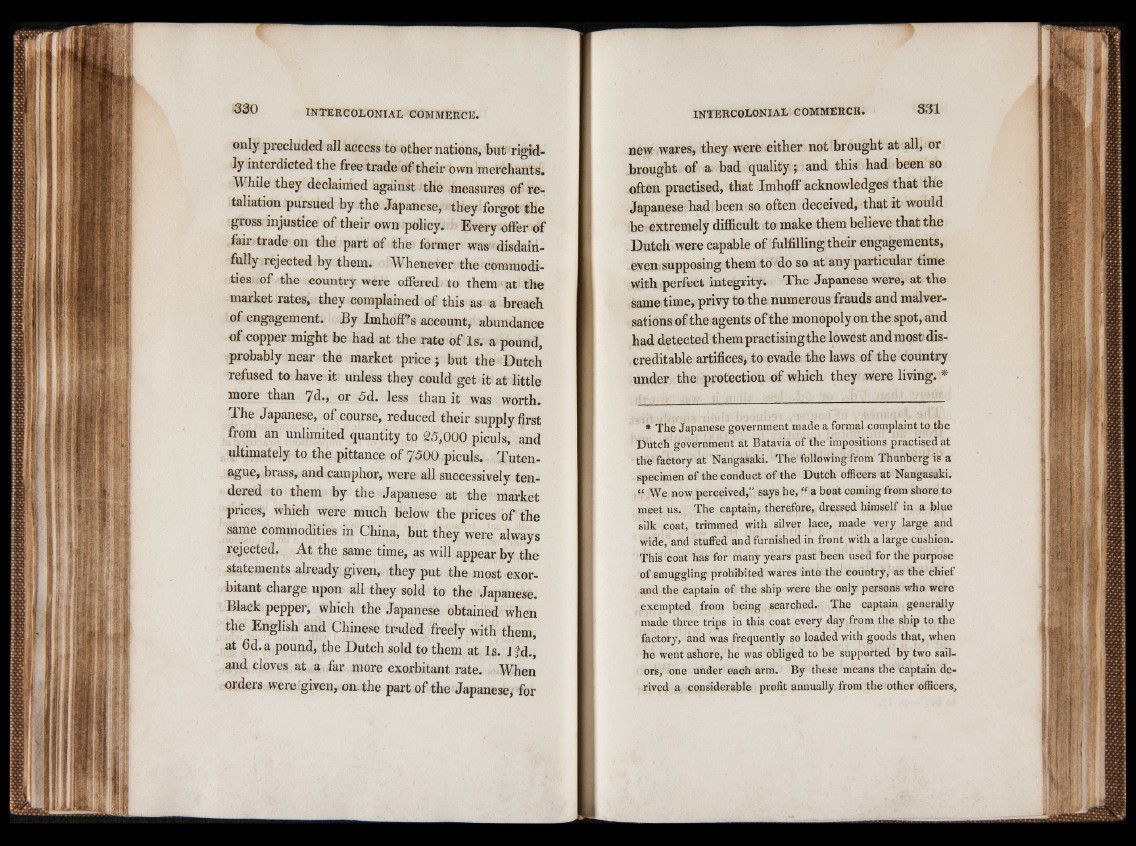
only precluded all access to other nations, but rigidly
interdicted the free trade of their own merchants.
While they declaimed against the measures of retaliation
pursued by the Japanese, they forgot the
gross injustice of their own policy. Every offer of
fair trade on the part of the former was disdainfully
rejected by them. Whenever the commodities
of the country were offered to them at the
market rates, they complained of this as a breach
of engagement. By ImhofPs account, abundance
of copper might be had at the rate of Is. a pound,
probably near the market price; but the Dutch
refused to have it unless they could get it at little
more than 7d*> or 5d. less than it was worth.
The Japanese, of course, reduced their supply first
from an unlimited quantity to 25,000 piculs, and
ultimately to the pittance of 7500 piculs. Tuten-
ague, brass, and camphor, were all successively tendered
to them by the Japanese at the market
prices, which were much below the prices of the
same commodities in China, but they were always
rejected. At the same time, as will appear by the
statements already given, they put the most exorbitant
charge upon all they sold to the Japanese.
Black pepper, which the Japanese obtained when
the English and Chinevse traded freely with them,
at 6d.a pound, the Dutch sold to them at Is. Jjd.,
and cloves at a far more exorbitant rate. When
orders were given, on4he part of the Japanese, for
?
new wares, they were either not brought at all, or
brought of a bad quality ; and this had been so
often practised, that Imhoff* acknowledges that the
Japanese had been so often deceived, that it would
be extremely difficult to make them believe that the
Dutch were capable of fulfilling their engagements,
even supposing them to do so at any particular time
with perfect integrity. The Japanese were, at the
same time, privy to the numerous frauds and malversations
of the agents of the monopoly on the spot, and
had detected them practising the lowest and most discreditable
artifices, to evade the laws of the country
under the protection of which they were living. *
* The Japanese government made a formal complaint to the
Dutch government at Batavia of the impositions practised at
the factory at Nangasaki. The following from Thunberg is a
specimen of the conduct of the Dutch officers at Nangasaki.
“ We now perceived,” says he, “ a boat coming from shore to
meet us. The captain, therefore, dressed himself in a blue
silk coat, trimmed with silver lace, made very large and
wideband stuffed and furnished in front with a large cushion.
This coat has for many years past been used for the purpose
of smuggling prohibited wares into the country, as the chief
and the captain of the ship were the only persons who were
exempted from being searched.- The captain generally
made three trips in this coat every day from the ship to the
factory, and was frequently so loaded with goods that, when
he went ashore, he was obliged to be supported by two sailors,
one under each arm. By these means the captain derived
a considerable profit annually from the other officers,